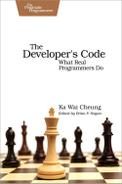| Essay 36 | Lie to Simplify |
When you teach something new, never start with the notion that everything you’re going to say from here on out is 100 percent correct. Teaching a concept perfectly from the get-go is neither practical nor efficient. Any advanced concept is inherently difficult to understand. That’s what makes it advanced. It’s full of nuances, exceptions, and special cases that don’t always fit into a nicely wrapped unified theory.
In contrast, when we learn something new, that nicely wrapped set of facts is exactly what we desperately crave. We want the hard and fast truths, whether or not they really exist, because they provide the foundation that helps us build our knowledge of any subject.
So, when you’re the expert, let go of the intricate details of your domain at first. Let go of the “except when” and “but not if” cases; they just aren’t that important right now. In the beginning, reveal the handful of rules that will get your student most of the way to understanding a concept well. Be comfortable with stretching the truth a bit to make the concept simpler. When you’re teaching, white lies aren’t always a bad thing.
When we pare down a complex topic into a less-than-perfect set of rules, it gives someone new a chance to build a solid foundation of understanding in their mind. When we teach subtleties and exceptions too early, before people have had a chance to soak in the general concepts, their learning becomes fragmented. Piecing together the whole story at once becomes difficult. It’s hard to digest both rules and exceptions to those rules at the same time.
For instance, when I teach someone about the basics of database modeling, I always start with the notion that a good relational database needs to be strictly normalized without exception. By Cheung’s Law, no two tables should carry redundant data.
In reality, there actually is a time and place to denormalize a database. For example, an OLAP cube is a type of database that breaks the conventional rule of database normalization in favor of redundant data.[11] Denormalized databases can make complex search queries much faster because they traverse fewer tables and require fewer relational JOINs. However, a novice shouldn’t even care about that in the beginning until he’s fully grasped the benefits of normalization. To understand the cracks in the foundation, he needs to intimately understand the foundation itself.
So, what if the understanding isn’t 100 percent correct immediately? A solid foundation of understanding is motivating. And motivation will get them to an advanced level faster.
